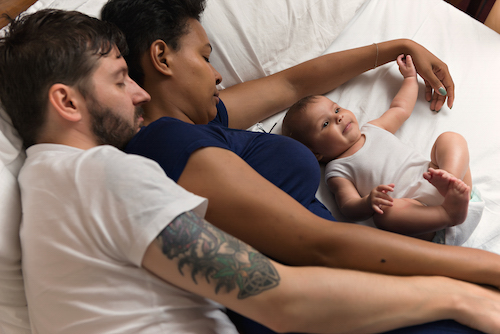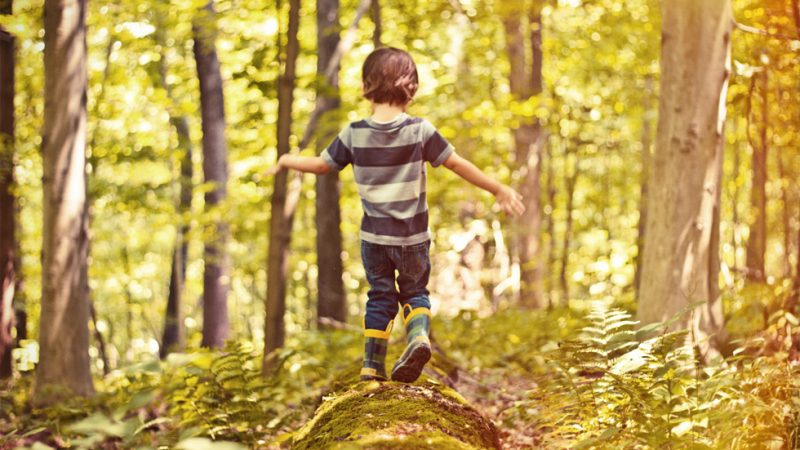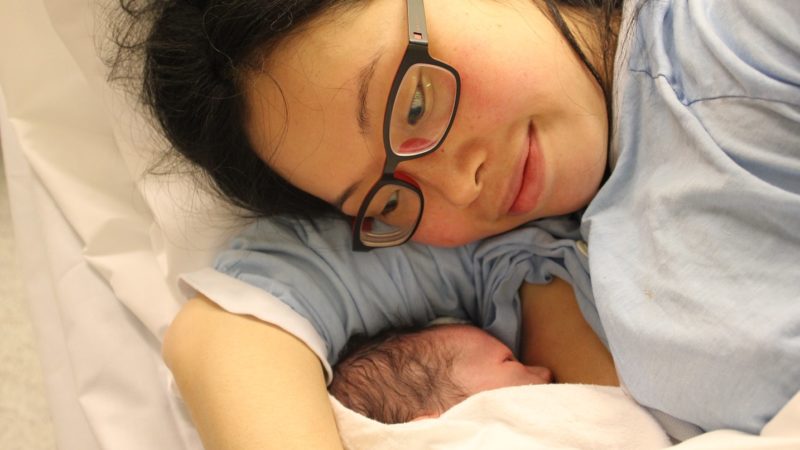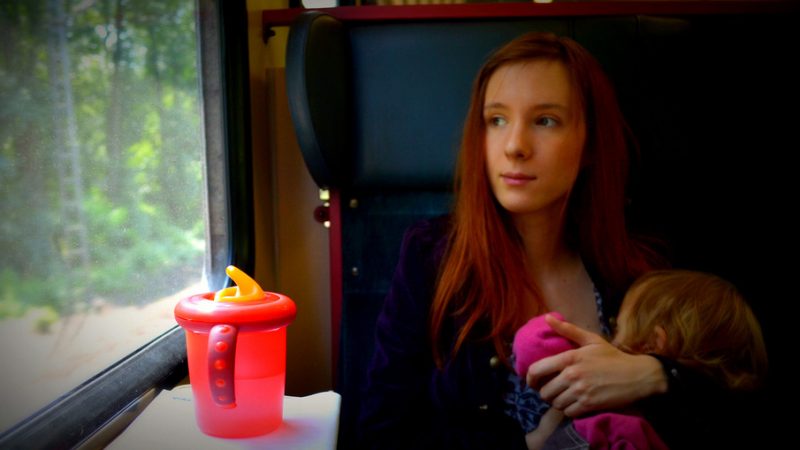
Co-sleeping – what research is there? A Q&A with Prof Helen Ball
Professor Helen Ball, infant sleep expert, was with us for the first ever PSG Q&A and so we were really excited to have her back with us again.
Image courtesy of Rob Mank via the Baby Sleep Info Source
Helen: Hi folks – I am an anthropologist at Durham Uni and have been researching parent-infant sleep for almost 25 years.
My daughters are now 26 and 22 years old, so no prizes for guessing what prompted my interest in this topic!
It will be interesting to see if people’s questions about co-sleeping have changed since the last time we did this 🙂
PSG O: Hi! Just interested in being a passenger on this Q&A. I didn’t co-sleep with either of mine, due to my own need for being alone (80’s child, swaddled and slept alone, now can’t have anything touch me in bed when sleeping!). I have more night contact with my second, but no conscious decisions were realised until babies came. I think I’m here for insight ??
PSG B: PSG’s power is definitely strengthened by our diversity in experiences.
And our insatiable curiosity!
Q: Helen, how have attitudes towards infant sleep changed in the 25 years that you have studying it?
PSG A: Wow that’s an impressively long time!
Helen: My experience is that mums are much less afraid to talk about co-sleeping and say they do it now more than 20 years ago — I think there is more support, even if not everyone is accepting.
I think the internet has prompted a massive change because now it is much easier to find like-minded people to talk to.
PSG E: I agree!
Q: Hi Helen, thanks for coming. I’m interested in co-sleeping as it seems very taboo, and so I avoided with my first but ended up co-sleeping with my second out of survival!
Interestingly my first is very clingy and my second is less so. Is this a result of co-sleeping or just nature of kids?
Helen: I’ve heard other mums say they think co-sleepers are less clingy, but it is hard when they are siblings to disentangle things like birth order from the rest. Later siblings have to fit in, while 1st children often get individual attention for several years. 🙂
Q: What does research say about co-sleeping with older kids? Should I be discouraging co-sleeping at some point?
Helen: Only if you want them out of your bed. Otherwise they will tell you when they want their space.
Q: I am currently training to be a breastfeeding peer supporter. This week’s session was on positioning/attachment & the side-lying position was mentioned. But then the visiting midwife said not to teach this to mums in hospital wards, as hospital beds are high and floors are hard!!
What would be the best articles/websites/resources you’d recommend for equipping & educating us peer supporters, the midwives & the new mums regarding safe co-sleeping (bearing in mind co-sleeping increases breastfeeding rates)?
Helen: Well, I might be a bit biased, but this one 🙂 https://www.basisonline.org.uk
This is my research team in Durham’s website for parents and HCPs. Here, we talk about breastfeeding and bedsharing
Hospital beds are high, but they CAN be lowered, and mesh side rails CAN be used, as can side car cots…..
PSG C: I was shown how to do this in hospital as my boobs are big, and I was really tired! I wasn’t about to let a neonate fall on the floor….!
PSG G: I thought mesh rails were a no-no for smalls?
Helen: We used mesh rails in our hospital studies with newborns. Maybe we have different kinds of mesh rails in mind?
PSG F: I know the ones sold to stop toddlers falling out of their beds recommend a higher minimum age. But I assumed that this was partially due to the risk of a mobile child falling out beyond the ends or over the top! So I used one with baby, just ensuring there was no gap between mattress & rail (& packing it flat with towels if there was one). Am I right/wrong in that logic?!
PSG G: I am thinking about these. I also just put a towel between the gap and the rail, I understood that the concern was for the baby’s limbs or face getting trapped in the gap rather than their face against the mesh perhaps?!
PSG F: Yes, though I also noticed different brands have the central mesh at different heights – some have the surroundings, made of more solid fabric, high enough up that technically the baby’s face could press against it (which doesn’t seem very breathable) rather than the mesh (which would concern me less)…
Q: What evidence is there about the safety of various positions when co-sleeping. For example, when baby will only sleep on you rather than next to you on a flat surface?
Helen: There is not a lot of evidence on this other than about falls from hospital beds, when mums fall asleep with baby on chest and baby slips off and cracks head on floor.
At home, if you are in the middle of a big bed, with no pillows that baby could suffocate in if they slide off in your sleep, then it is less risky, but baby on flat surface next to mum is safer.
PSG H: Is it the same with baby on their side breast sleeping? Is it an issue that they aren’t lying on their back per the guidelines?
Helen: Yes, for SIDS risk reduction
PSG F: Is it better to have baby lying on their back next to mum & turning their head to the side to latch then? (Rather than baby lying on their side as they could then roll onto their front).
Baby twisting their neck to latch sideways isn’t the best positioning advice from our breastfeeding training view, but is it safer & less risky than baby on it’s side?
Helen: It depends on its age. Older babies can turn their head, younger babies need their whole body tilted, but they don’t need to be right up on their side in a position where they could roll forwards. Getting into habit of pushing them back onto their back after a feed is a good thing to do.
PSG F: Could they safely be propped a little from behind then, so as to be tilted enough to latch without being completely on their side? Until what age? Is mum’s hand on baby’s torso a good or bad idea (intending to help support, but possibly falling asleep that way)?
Helen: Propped with mums arm, yes, propped with something else – no. Because the something else can become a head-covering or suffocation hazard once mum is asleep and the baby moves around.
Q: Hi Helen ?? thanks for being here.
You hear/read a lot about the maximum age a child should be allowed to come into their parents’ bed, but do you think there’s a minimum period? I read something recently that said that children should sleep in the parental bed for a minimum of 3 years…
Helen: That was a newspaper article quoting a piece of research by Nils Bergman, but the 3 years thing was just his personal opinion. There is no research that has determined optimal minimum or maximum durations for having a child co-sleep.
Q: I’m really interested in how people weigh up risk.
We’re told all about how risky co-sleeping is, for example, but I eventually worried more about the risk I was so exhausted I’d drop the baby passing out. Is there any research about whether people are able to make decisions based on proper information about risk, or if they’re deciding based on culture, or (extremely valid) emotional reasons like just being happier?
Helen: The research on risk perception suggests we are particularly bad at assessing it in all sorts of contexts…
Q: Is there any research that differentiates between SIDS and suffocation when bed sharing? Or unsafe co-sleeping and co-sleeping following the guidelines?
All too often unsafe co sleeping such as falling asleep on the sofa, gets put into the same statistics.
Helen: Try this: Hazardous co-sleeping environments and risk factors amenable to change
PSG L: From how I understand it, in SIDS statistics, safe bedsharing and unsafe bedsharing (such as falling asleep on sofas) are lumped together, making safe bedsharing look very dangerous. Why?
Helen: In this guidance for HCPs we tried to separate the most hazardous scenarios and explain the relative risks: link to UNICEF guidance
PSG M: Yes I wonder this too, because if you take out the smoking, drug taking and on the sofa co-sleeping then co-sleeping is safer than not (from what I can work out).
Helen: When you avoid the key hazards there is very little to separate bedsharing and cot sleeping for SIDS risk. Accidental suffocation is more likely in bed usually due to ‘human error’ i.e. parents behaviour.
PSG L: So why are the two still added together in statistics? I guess the question is, who gains from lumping them together? It’s certainly not the families with young babies and no sleep…!
Helen: The medical establishment is very cautious. In UK we now recommend advising parents of their particular risks, in US they still say avoid all bedsharing. They are more cautious than we are.
This paper gives you an idea of the differences: The Atlantic Divide: Contrasting U.K. and U.S. Recommendations on Co-sleeping and Bed-Sharing
PSG L: I read up on the Norwegian guidelines when I was pregnant with my eldest (I’m Norwegian), and it says: as long as the safe sleep guidelines are followed, there’s no reason to discourage bed-sharing. It’s a shame it’s so different from country to country.
Helen: I often quote the Norwegian guidance!
Q: What evidence is there around safe co-sleeping with more than one child? So often the second baby arrives while the first one is still in the bed and people panic about trying to get the older one out. Can it be done safely?
PSG L: I have all three of mine in bed with me, so hoping we’re not going to get told off! Baby on the outside, then me, then the 2yo and then the 4yo next to the wall.
PSG I: I would have thought that as long as you were a barrier between your baby and the older child, it would be okay. Likewise your partner in the bed? I didn’t let my youngest sleep near to his brother for ages, as he’s like a heat seeking child who likes to cuddle up to us – limpet style – in the night. I was worried he’d get squished!
Helen: This is what I always recommend.
Children have much less awareness their sleep and have been known to lie across the baby in rare cases and prevent baby from breathing, so best to separate them either side of an adult.
Q: My first son couldn’t latch and so I exclusively expressed for him. I read a lot about the fact that co-sleeping is safest (or perhaps should only be done), when the mother is breastfeeding. Do you know whether there is any evidence about whether it is the breastmilk (and hormones in a lactating mother), that causes this effect or direct nursing only?
Helen: An excellent question! it depends on the effect of the breast-feeding/breastmilk production on the mother’s sleep but no-one has a good handle on that research wise. I don’t personally think you have to be breastfeeding to bedshare safely, because it is clear that some dads and non-breastfeeding mums do it exactly as breastfeeding mums do, but it is more variable. However the only study looking at this was done in our lab and I think the sample was too small to draw any firm conclusions.
Q: What research is there around the effects in children of parents who end their co-sleeping journey rather that being prompted by the child? Is there anything like this?
Helen: None that I am aware of – I think it would have been well publicised if it had been done….
PSG A: Is there any research about the end of co-sleeping journeys at all? If so, what did it find?
Helen: Not that i am aware of, but it would be in the psych literature if there is.
Q: Not a question really but….. argh! All I feel I see in the media is negative and biased pieces on co-sleeping with poor information on how to do so safely.
Helen: Sensationalising the issue sells papers/clicks on stories. Be cynical about why these stories are published – they make money. Nice happy stories don’t get shared.
Q: I bedshared with both my babies and although they woke A LOT during the night to feed, because I was able to get back to sleep super easily, I generally felt well rested.
Do your sleep studies show this too? i.e. if you have your baby close you can get back to sleep more easily and so it almost doesn’t matter how many times you’re woken vs someone who is getting UP and out of bed to tend to a baby.
Helen: The co-sleeping experience is quite variable so some babies boob all night but others don’t. Mums with the first kind of baby definitely feel as though they get back to sleep more quickly and easily if they have babe in bed. I am hoping to do a study on some aspects of this question next year in our new lab 🙂
PSG S: Ah fabulous! That will be so interesting. Thanks!
Q: What are children like as they get older? I just noticed that my 18mo and 4yo are sleeping next to each other now and aren’t as disturbed by random movements anymore. We just shared a double bed with adult on either side to stop them falling out and they slept absolutely fine – is there research on child safety, habits, emotional development too?
Helen: This study comes to mind: Outcome Correlates of Parent-Child Bedsharing: An Eighteen-Year Longitudinal Study
PSG G: thank you!
Q: Helen, do you think there’s also an element of snobbery/status signalling involved with the whole separate bedroom for infants? Surely much of the world’s families sleep in one room? Separate bedrooms are a bit of a luxury.
Has any research been done on families in poorer areas who share one bedroom and therefore possibly a bed? If so, are there high incidences of infant deaths? Or is it not the case, because human mothers have been sharing a sleeping surface with their young for thousands of years?
Helen: When we studied Asian families in Bradford they all slept in one room, often with several beds pushed together. It is normal cultural practice, and they had a 4x lower SIDS rate than the white British families in the same neighbourhoods.
But they don’t drink, and women don’t smoke, and they never slept on the sofa, so it is a combination of factors affecting the different sleep environments, not just the sleep space.
This is the paper based on this research: A qualitative study in parental perceptions and understanding of SIDS-reduction guidance in a UK bi-cultural urban community.
Q: Do you know why the advice from healthcare professionals has always been so negative towards co-sleeping? Is it a cultural thing?
Everything I’ve read suggests that if it’s done safely then it has lots of benefits and similar risk levels for SIDS etc, but a lot of professionals will just outright say not to do it.
Helen: HCPs usually have to give the guidance required by their Trust. Since the NICE review of co-sleeping and SIDS, UK trusts have been gradually switching to offering informed choice rather than advising against. There will be a new initiative launched during Safer Sleep Week (March 2019) that I hope will make an impact in even more NHS trusts.
PSG P: That sounds like a very positive move. ?
I’m a medical student and we had a lecture from a paediatrician who had done some work (I believe with you?) on co-sleeper cots in a post-natal ward and was very enthusiastic about it, but they didn’t have anything similar at my local hospital when I had my 2 children.
Helen: Yes, that was our research. The company who used to make side car cots in UK stopped manufacturing them. We need another to fill the gap – they are so valuable, especially post-c-section.
PSG P: That’s a shame. I would have absolutely valued having one after my most recent baby. I had a spinal in the end and she was very, very heavy (11lb 11oz) so getting her in and out of the cot was a real challenge for me. I can only imagine what it would have been like if I’d also had the abdominal pain and stitches from a c-section!
Q: If half of all SIDS cases are in cots and half of all are co-sleeping, but 90% of co-sleeping deaths could be removed by avoiding risk factors, does this mean that bedsharing is safer than cot sleeping if done safely?
I’ve been wanting to ask this since I saw this infographic!
Helen: Nope. The 50% in cots will include all sorts of scenarios where people didn’t follow safe cot sleeping guidance like prone position, smoking etc. If you follow all the safe sleep guidance in both cases the risks are very, very low
PSG T: Brilliant thank you! My mind can rest now…
Helen: The basic difference is the cot is a safe cage, designed to keep babies safe if used correctly. The bed is not designed with baby safety as priority so parents have to take responsibility for doing this. Not all parents do…
PSG T: I see. And the public health messages are there for cot safety (empty cot, feet to foot, on their backs) but not for co-sleeping.
Helen: Yep because the easy option was to tell everyone to put their baby in a cage!
Q: We’ve talked about how when it’s done safely, the risks of co-sleeping are pretty low. Do we know whether most people are doing safely? I wonder whether cot sleeping is generally safer because people will generally adhere to safe sleeping guidelines, whereas that might go more awry with co-sleeping.
Helen: Yes, see my last reply above. There is definitely more that can go awry with co-sleeping if people don’t think ahead, or do it accidentally — which is why providing ALL parents with safe co-sleeping info is vital, even if they think they’ll never do it. Because one day most of them will!
PSG L: But then again, lots of people have cot bumpers and soft toys in cots…
Helen: Yes – people cherry pick the SIDS guidance and think they can cancel out the risk say, of smoking, by implementing the other advice. It doesn’t work that way….
Q: Why is it often more acceptable to have your pet sleep in the bed than your own child? That really puzzles me ?
Helen: Ah now, that will relate to the influence of the Church in the 16th & 17th century on women (who had few options for controlling their reproduction) using ‘overlay’ as a form of covert infanticide. Many attitudes to it being morally wrong to co-sleep stem from then…
PSG I: Was it really the mothers doing it? It seems awful and so strange to imagine a woman smothering a child she’s carried for 9 months and given birth to ?
Q: Have there been any interesting developments / studies related to infant sleep since your last Q&A with us?
Helen: this was one of our recent studies that I particularly liked the outcome of : Discrepancies in maternal reports of infant sleep vs. actigraphy by mode of feeding (comparing mother’s reports of their babies sleep to data obtained by a sensor).
Q: What research questions are you hoping to investigate next in this area?
Helen: I want to put the question to rest re. bed-sharing by breastfeeders vs formula feeders — how does it differ, is it less safe. and how does bedsharing affect the sleep of mums and babies in each group?
PSG Q: Can we have some exclusive expressers in there too please? (I don’t ask for much! ?)
Helen: They might be a challenge to find…
PSG Q: Well, I run an exclusively expressing UK Facebook page with 250 members at the moment (obviously this will change by the time you do your research), but let me know if you need help recruiting! There’s more out there than you might think.
PSG P: Thank you Helen. Your online advice has saved my sanity as a parent (with 2 “poor” sleepers) both in relation to safe co-sleeping, but also having the information about normal infant sleep so that I was able to point out that my 1st, while not sleeping a huge amount, was still within the range of normal (I used that phrase a lot!) and therefore we didn’t need to do anything to “fix” him!
Want more of Helen’s wisdom? Why not check out our first ever Q&A – a chat with Helen on Infant Sleep.
You can find lots more Q&As on all sorts of parenting-related topics on the Q&A section of our website. Why not try:
- Vexing Vegetables with Dr Helen Coulthard – why do kids often not fancy eating their greens?
- Rural Childhoods with Dr Philomena de Lima – what do we know about the effect of the location in which we bring up our children?
- How Much Bigger? with PhD student Hannah Hartley and Dr Zoe Darwin – can you gain to much weight during pregnancy?
- An introduction to Language Development with Dr Silke Brandt – how do kids learn to talk and how can we help them?


